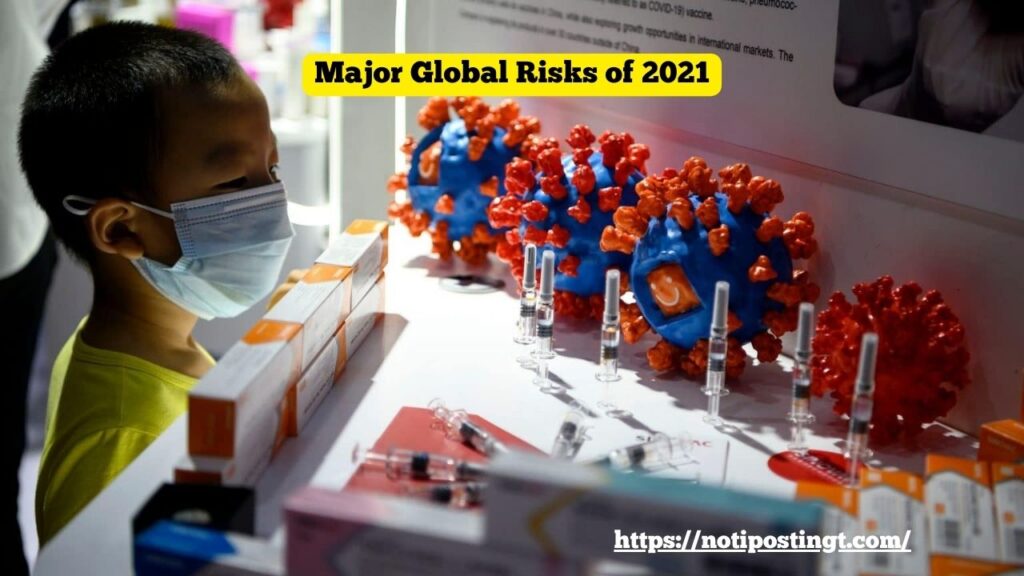Introduction
In 2024, the world faced unprecedented challenges, shaped by a confluence of factors that tested global resilience. This comprehensive analysis delves into the principales riesgos mundiales 2021, offering insights into the major global risks that dominated the year. From the lingering effects of the COVID-19 pandemic to the growing threat of climate change, this article explores the key issues that defined the global risk landscape in 2024. https://finanzasdomesticas.com/principales-riesgos-mundiales-2021/
Overview of Major Global Risks
The year 2021 was a pivotal moment in history, marked by significant events that reshaped the global risk landscape. As the world grappled with the aftermath of the COVID-19 pandemic, other risks, such as climate change, economic instability, and geopolitical tensions, emerged more prominently. This analysis seeks to provide a detailed overview of the principales riesgos mundiales 2021, highlighting the most pressing challenges and offering insights into their implications for the future.
COVID-19 and Economic Recovery
Uneven Recovery
The COVID-19 pandemic continues to affect global economies, with varying recovery rates. Widespread vaccination rollouts face challenges, leading to a prolonged and uneven recovery, particularly in Latin America.
Debt and Unemployment
Countries are grappling with high public debt and increased unemployment, exacerbating economic disparities and fueling social unrest. https://finanzasdomesticas.com/principales-riesgos-mundiales-2021/
Geopolitical Tensions
US-China Relations
Tensions between the US and China remain high despite the new US administration. Competition over technological dominance and climate leadership intensifies, impacting global trade and diplomacy.
Middle East Instability
Low energy prices and political instability in the Middle East, particularly in Iraq and Algeria, pose significant risks. Economic challenges and potential civil unrest could destabilize the region further. https://finanzasdomesticas.com/principales-riesgos-mundiales-2021/
Climate Change
Global Competition
Climate change transitions from a cooperative to a competitive arena as major powers strive for leadership in carbon neutrality. This shift exacerbates global divisions and complicates international cooperation.
Also Read : https://finanzasdomesticas.com/euribor-sube/ : Detailed Overview
Impact on Key Regions
Latin America
Healthcare and Elections
Latin America’s delayed vaccine rollout and upcoming elections in countries like Argentina and Mexico add layers of uncertainty. Economic vulnerabilities and social service cuts may lead to increased political instability.
Middle East
Economic Pressures
Countries heavily reliant on oil revenues, such as Iraq and Saudi Arabia, face economic pressures from low oil prices. This financial strain could lead to heightened social unrest and political challenges.
Turkey
Political and Economic Struggles
Turkey faces significant economic pressures and political tensions due to its poor COVID-19 response and financial instability. Rising interest rates and strained relations with the EU and Middle East further complicate the situation.
Strategies for Mitigating Risks
Strengthening International Cooperation
Multilateral Approaches
Countries need to strengthen multilateral cooperation to address global challenges like COVID-19 and climate change. Collaborative efforts can enhance vaccine distribution and foster sustainable economic recovery.
Economic Diversification
Reducing Reliance on Single Sectors
Nations, especially those in the Middle East, should diversify their economies to reduce reliance on single sectors like oil. Investing in renewable energy and technology can create more resilient economies.
Social Policies
Addressing Inequality
Implementing robust social policies to address inequality and support vulnerable populations is crucial. Enhancing social safety nets can mitigate the social impact of economic downturns and foster stability.
The Impact of the COVID-19 Pandemic
The COVID-19 pandemic continued to be a dominant force in 2021, affecting nearly every aspect of global life. The pandemic’s reach extended beyond public health, influencing economic stability, social structures, and international relations. As countries rolled out vaccination campaigns, disparities in vaccine access highlighted global inequalities, raising concerns about the fairness and effectiveness of the global response. The pandemic also underscored the importance of global cooperation and the need for robust public health infrastructure to manage future health crises.
Economic Consequences and Recovery
The economic impact of the pandemic was profound, with many economies experiencing significant downturns. Lockdowns and restrictions disrupted industries, leading to job losses and reduced consumer spending. While some economies showed signs of recovery, others struggled with ongoing challenges, such as supply chain disruptions and inflationary pressures. The uneven pace of economic recovery highlighted the importance of targeted fiscal policies and international cooperation to support vulnerable economies.
Climate Change and Environmental Risks
Climate change remained one of the most critical global risks in 2021, with increasing evidence of its far-reaching effects. The year saw a series of extreme weather events, including wildfires, floods, and hurricanes, which underscored the urgency of addressing climate change. The UN Climate Change Conference (COP26) held in Glasgow brought global leaders together to discuss strategies for reducing carbon emissions and mitigating the impacts of climate change. However, despite these efforts, there remains a significant gap between current actions and the goals needed to prevent catastrophic climate change.
Biodiversity Loss and Ecosystem Degradation
In addition to climate change, biodiversity loss and ecosystem degradation emerged as pressing environmental concerns. The destruction of habitats, pollution, and overexploitation of natural resources continued to threaten biodiversity, with significant implications for food security, human health, and economic stability. Efforts to protect and restore ecosystems are crucial for maintaining the planet’s ecological balance and supporting sustainable development.
Geopolitical Tensions and Conflict
Geopolitical tensions and conflict continued to pose significant risks in 2021. The year saw a rise in regional conflicts, political instability, and tensions between major powers. Issues such as territorial disputes, cyber warfare, and the spread of misinformation further complicated the global geopolitical landscape. The risk of conflict was exacerbated by the increasing competition for resources and the strategic importance of technology and information.
Cybersecurity and Digital Risks
The digitalization of society has brought about numerous benefits but also introduced new risks. Cybersecurity threats, including cyberattacks on critical infrastructure and data breaches, have become more prevalent, posing significant challenges for governments, businesses, and individuals. The rapid pace of technological change, coupled with the increasing reliance on digital systems, has made cybersecurity a top priority for global risk management.
Social Inequality and Human Rights
Social inequality and human rights issues remained at the forefront of global concerns in 2021. The pandemic exacerbated existing inequalities, with marginalized communities disproportionately affected by health and economic challenges. Issues such as racial discrimination, gender inequality, and the plight of refugees and migrants highlighted the need for more inclusive and equitable policies. Addressing these social issues is critical for fostering social cohesion and ensuring sustainable development.
Humanitarian Crises and Migration
Humanitarian crises, driven by conflict, environmental degradation, and economic hardship, continued to displace millions of people worldwide. The challenges faced by refugees and migrants were compounded by restrictive immigration policies and inadequate international support. Addressing the root causes of displacement and providing humanitarian assistance are essential for mitigating the impact of these crises.
Global Health and Pandemic Preparedness
The COVID-19 pandemic underscored the importance of global health and pandemic preparedness. The rapid spread of the virus highlighted the interconnectedness of global health systems and the need for coordinated responses. Strengthening global health infrastructure, investing in research and development, and ensuring equitable access to healthcare are critical for preventing and managing future pandemics.
Vaccination and Public Health Policies
Vaccination campaigns played a crucial role in controlling the spread of COVID-19, but disparities in vaccine distribution revealed significant gaps in global health equity. Ensuring access to vaccines and other public health resources is essential for protecting vulnerable populations and achieving global health goals.
Economic Inequality and Poverty
Economic inequality and poverty were exacerbated by the pandemic, with vulnerable populations facing increased hardships. The economic fallout from the pandemic disproportionately affected low-income workers, small businesses, and developing economies. Addressing economic inequality requires comprehensive policies that promote inclusive growth, support social protection systems, and reduce disparities in wealth and opportunity.
Global Trade and Supply Chain Disruptions
Global trade and supply chain disruptions were significant challenges in 2021, affecting the availability of goods and services worldwide. The pandemic exposed vulnerabilities in supply chains, highlighting the need for more resilient and diversified trade networks. Addressing these challenges requires international cooperation and policies that support sustainable trade practices.
Technological Advancements and Ethical Considerations
Technological advancements continued to transform society, offering new opportunities but also raising ethical considerations. Issues such as data privacy, artificial intelligence, and automation pose significant challenges for policymakers and businesses. Balancing innovation with ethical considerations is essential for ensuring that technology serves the public good.
Artificial Intelligence and Automation
Artificial intelligence and automation have the potential to revolutionize industries and improve efficiency. However, these technologies also raise concerns about job displacement, privacy, and the ethical implications of decision-making algorithms. Addressing these issues requires comprehensive regulatory frameworks and public engagement.
Future Outlook and Preparedness
Looking ahead, the global risk landscape is likely to be shaped by the ongoing challenges of climate change, geopolitical tensions, and technological advancements. Strengthening global governance, promoting international cooperation, and investing in resilience are critical for addressing these risks and building a more sustainable and equitable world.
Strengthening Global Governance
Effective global governance is essential for managing transnational risks and promoting international cooperation. Strengthening institutions, enhancing transparency, and fostering collaboration are key to addressing global challenges and achieving shared goals.
Principales Riesgos Mundiales 2021
The principales riesgos mundiales 2021 highlighted the interconnectedness of global risks and the need for comprehensive and coordinated responses. From public health crises to environmental threats, the challenges faced by the world require innovative solutions and a commitment to sustainable development. By understanding these risks and taking proactive measures, we can build a more resilient and inclusive global community.
Conclusion
The year 2021 is marked by significant global risks driven by the COVID-19 pandemic, geopolitical tensions, economic pressures, and climate change. Understanding these risks and implementing strategic measures can help mitigate their impact and foster a more stable global environment. For more detailed insights and updates, visit Finanzas Domesticas. https://finanzasdomesticas.com/principales-riesgos-mundiales-2021/
Also Read : All GM Car Show Macungie: A Celebration of Automotive Excellence
FAQs
What are the major global risks in 2021?
The major risks include the prolonged impact of COVID-19, geopolitical tensions, economic instability, and climate change. https://finanzasdomesticas.com/principales-riesgos-mundiales-2021/
How is COVID-19 affecting global economic recovery?
COVID-19 is causing an uneven economic recovery with challenges in vaccine distribution, high public debt, and increased unemployment, particularly in Latin America. https://finanzasdomesticas.com/principales-riesgos-mundiales-2021/
What are the key geopolitical tensions in 2021?
Key tensions include US-China relations and instability in the Middle East due to low energy prices and political unrest. https://finanzasdomesticas.com/principales-riesgos-mundiales-2021/
How is climate change influencing global risks?
Climate change is shifting from a cooperative issue to a competitive one, with major powers vying for leadership in carbon neutrality, exacerbating global divisions. https://finanzasdomesticas.com/principales-riesgos-mundiales-2021/
What strategies can mitigate these global risks?
Strategies include strengthening international cooperation, diversifying economies, and implementing social policies to address inequality and support vulnerable populations.



